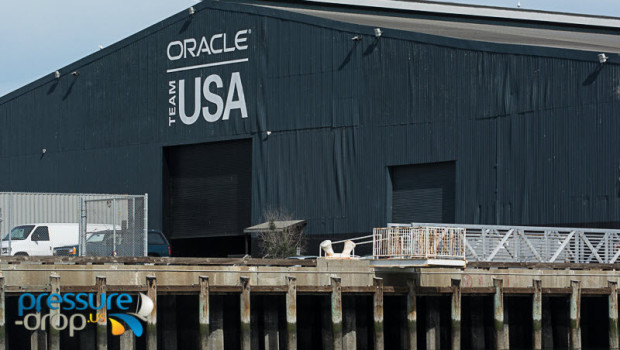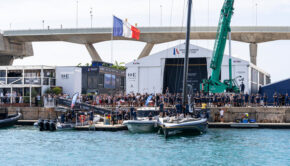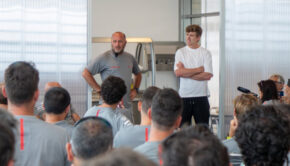America’s Cup: Courts and Sailor Compensation
Published on March 15th, 2015
In the absence of America’s Cup racing, we instead have America’s Cup lawyering, in which we get a look at the rarely disclosed world of sailor payment. To help navigate these waters, legal analyst Cory E. Friedman provides this report….
“Pigs get fat, hogs get slaughtered.” – Anon.
In today’s media market, if it bleeds it leads, and the arrest of an AC 45 owned by Oracle Racing, Larry Ellison’s America’s Cup (AC) racing team, has been headlined around the world and even made the Wall Street Journal – not to mention generating oceans of schadenfreude. So let us cut through the hype and take a look at what is actually happening. This is the entitled world of Oracle Racing and strange things happen.
Joseph Spooner is a former AC grinder. He pumped hydraulic fluid, much like the belt on many motor vehicles that turns the power steering pump that aids turning the front wheels when the driver turns the steering wheel. According to the recommendation Jimmy Spithill wrote for his visa application and the cardio numbers he has submitted to the Federal Court in San Francisco, he was an excellent grinder in top physical condition.
But even top grinders do not win MacArthur Genius Grants, Nobel Prizes or Knighthoods, and are hardly unique. According to alleged comments about his age allegedly foolishly made by Russell Coutts, who should know that commenting on the age of employees is legally taboo, he is an aging grinder in the new youth oriented AC in which, as Dean Barker recently learned, 40 is the new 70.
Immediately following the AC 34 victory in San Francisco in 2013, Oracle Racing and Spooner entered into what amounted to a preliminary contract to run through AC 35 which was intended to be superseded by a final, much more detailed, contract, but never was. As headlined in the press, Spooner’s compensation was generous — US$25,000/month plus a US$4,000/month housing allowance plus many other benefits including, for example, annual tickets back to New Zealand for the family.
Given his age, AC 35 might well have been Spooner’s valedictory and he then could have moved into some other less physically demanding AC related role. Now he likely is done as a professional sailor.
After signing the preliminary contract Oracle announced that AC 35 would be in Bermuda and Spooner discovered that Bermuda is even more expensive than San Francisco (hard to believe, but I am not making this up) and a three bedroom home meeting his family standards could not be rented for US$4,000/month (the Bermuda Dollar is at par with the US dollar). He apparently did not feel he should pay any of his housing costs out of salary as most of us do.
Therefore, he demanded a raise if he was to relocate to Bermuda. On behalf of Oracle Racing, Grant Simmer told him no to the raise, exercised the termination for any reason on two weeks’ notice provision of the preliminary contract, for which he would be paid two weeks wages, and basically told him not to let the door hit him in the ass on his way out.
Spooner then sued for the AC 45 he claims he sailed on and Oracle Racing for over $700,000, claiming that number includes, but is not limited to, the total wages and win bonus he would have received had he not been fired.
Suing a vessel seems like an odd thing to do, but maritime law is considerably different from the common law we are used to.
When farmer Jones sued farmer Smith because farmer Smith did not pay for the horse he bought, farmer Smith had likely never been more than 20 miles from his birthplace and was not going anywhere. For hundreds of years ships have been sailing all around the world and once a ship leaves port there is no one to sue for seaman’s wages, necessaries (like food, fuel, sailcloth, rope, timber, etc.) supplied to the ship by chandlers. So, under certain circumstances for certain claims, a seaman or supplier of necessaries, in order to make sure the ship cannot sail away without paying, can sue the ship in rem (in rem means suing the thing) and have it arrested so that it cannot leave port until the bill is adjudicated.
That is what Spooner did. His first try was unsuccessful, as the Chief Magistrate Judge in San Francisco, to whom the matter was referred by the District Court Judge, essentially determined in a long, detailed, well researched, thoughtful and well written decision (Feb. 23) that Spooner was not owed anything and therefore had no claim upon which an arrest of the vessel could be granted. He granted Spooner leave to amend his complaint and try again.
Spooner’s lawyer amended the complaint and filed it first thing on a Friday morning (Mar. 6). Claiming that she could not get hold of the Chief Magistrate Judge’s staff to ask for a hearing, his lawyer went to the Clerk of the Court claiming “exigent circumstances,” namely that the containers holding the vessel might be moved, justifying the issuance of an arrest by the Clerk under the Admiralty Rules. (She does not explain why she did not go before the designated Emergency Judge who in most districts is available 24/7 for – emergencies.)
The Clerk issued an arrest order which resulted in the Federal Marshalls going out to Oracle’s base in San Francisco on Monday (Mar. 9) and putting stickers on three containers of boat parts, thereby generating headlines around the world.
Understandably, Oracle Racing was not thrilled about the arrest order and filed a request to release the AC 45 from arrest, to which Spooner’s lawyer responded. The court has set a hearing for March 17, 2015 to resolve the matter as vessel arrests are always quickly dealt with. No matter what happens Oracle Racing can post a bond to substitute for the arrested vessel.
There are a host of highly technical factual issues and issues of maritime law involved, but they break down into some broad categories.
The first issue is whether there really were exigent circumstances justifying the issuance of an arrest order by the Clerk. The parties vigorously squabble over that issue for two reasons. First of all, if there were not exigent circumstances, the arrest must be released. The second is that Spooner would be liable for any damages Oracle Racing can demonstrate it suffered because of the improper arrest. Having lost once on the issue of arrest and having less than convincing arguments, Spooner is not looking good on exigent circumstances. It looks like the arrest was more a litigation tool to force Oracle to pay, rather than a truly necessary arrest, especially as Oracle Racing is a California business entity, is not going anywhere, and can be sued for damages without a vessel arrest.
A sub issue is whether the vessel Spooner actually sailed on is the one in the containers that have been stickered. Apparently, the numbers painted on the sides of the boats and their actual serial numbers may not match and 4 may not really be 4. Do not expect the Court to try to figure out under which walnut shell 4 really can be found.
The next issue is whether this is even the type of dispute that gives rise to the right to arrest a vessel. The Chief Magistrate Judge assumed but did not decide that the last time around and may well do so again for the same reason — that it does not matter. In his Amended Complaint, Spooner’s lawyer has spun out a bunch issues that sound complicated and supposedly add up to Spooner having the right to long term employment and some sort of unpaid maritime contract, but those arguments do not hang together, have anything to do with the dispute or add up to anything.
For example, Spooner’s visa application, which he – not Oracle Racing – submitted, required submission of a copy of his contract, in this case the preliminary contract. The fact that he submitted it does not make it anything but what it is, which is terminable on two weeks’ notice. It certainly does not bind Oracle Racing and if the preliminary contract is insufficient for the issuance of a visa, all that means is that Spooner has an immigration problem if he stays in the US. Indeed, having been fired, he may have an immigration problem now if he is in the US.
Most of the other arguments trying to transform the preliminary contract into what would have been a final contract and a maritime contract do not compute. For example, you can claim that public policy supports a result provided by the law. You cannot claim, as Spooner’s lawyer does, that public policy supports a result that is not provided by the law. That is merely an argument to be made to Congress to change the law. Bolding the font or adding exclamation points does not help. A claim for necessaries requires unpaid necessaries, which do not exist.
The Court will undoubtedly deal with all these issues, but as in the last instance, it likely will come down to whether Oracle Racing owes Spooner anything. No claim for damages equals no arrest. On that issue, stripped of all the smoke and mirrors, Spooner does not look any better than last time.
Spooner signed a contract that provided for termination by either party for any reason on two weeks’ notice. The fact that Oracle Racing had no Human Resources Department, and Oracle Racing’s British lawyer Sam Hollis is not admitted in California, and thus cannot engage in the authorized practice of law, makes no difference. He was Oracle’s lawyer, not Spooner’s lawyer. Spooner is an adult and should have had his own lawyer look at the preliminary contract.
Even more fundamentally, no matter what contract Spooner had, an employee who refuses to work for the agreed wages can be fired and does not have a claim for anything. Calling that firing retaliatory is simply silly. It is not retaliatory. It is the deal. Walk away from it and you are done. So is your vessel arrest. Don’t let the door hit you in the ass on the way out.
© Cory E. Friedman 2015








 We’ll keep your information safe.
We’ll keep your information safe.